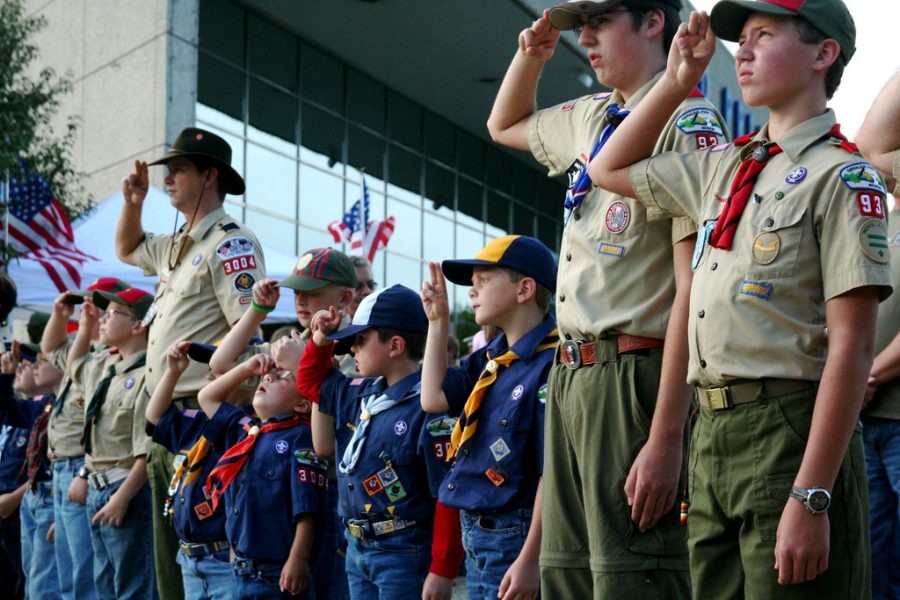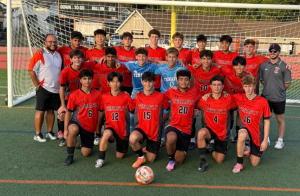Boy…Scouts?
With Boy Scouts of America soon to expand its program to girls and change its name to Scouts BSA, many wonder how the decision will affect Scouting as a whole.
May 16, 2018
For years, the Boy Scouts and the Girl Scouts—and their respective participants—have been completely different. And why shouldn’t they be? They’re two completely different organizations with two completely different sets of objectives for their participants. One roasts canned food over an open fire in the great outdoors, and the other…sells cookies? And occasionally makes bracelets? The recent debate over whether the Boy Scouts should expand their membership to girls has been one of relatively small controversy—following its decision to expand its limitations on gay and trans members—but with big-name conservatives such as Steven Crowder and Ben Shapiro slamming it through videos and editorials, I thought it was an issue worth shedding light on.
First, it’s worth establishing that the two are, indeed, different organizations. As an organization, Girl Scouts, despite the aforementioned stereotyping of its participants, has more to offer than just baked goods—its mission is to empower girls to thrive and lead. There’s something to be said about the importance of solidarity, and research shows the significance of girls being comfortable in a girl-only environment. This specific focus on gendered programming is built to close the gap of confidence between boys and girls from a young age on. As Sylvia Acevedo—the CEO of the program—said in a blog post, “Girl Scouts is the premier leadership development organization for girls…We are, and will remain, the first choice for girls and parents who want to provide their girls opportunities to build new skills…and grow into happy, successful, civically engaged adults.” Meanwhile, I’m sure I don’t need to explain the benefits of the Boy Scouts program.
Notwithstanding this, however, no one can deny the wide split between the extracurricular boons that the two can provide. The Girl Scout Gold Award, revered as it is, just doesn’t have the same name recognition as the rank of Eagle Scout. And though “name recognition” obviously isn’t all that matters for weighing the value of decoration, the lack of representation of the Gold Award (and Girl Scouts in general) in our culture likely, in some way, contributes to a lesser worth. Tons of people don’t even know that an “equivalent” to Eagle—if you could even call it that?—exists in the Girl Scouts, myself included. I had to Google it.
This results in is the general opinion that Girl Scouts, in some way, has less merit than Boy Scouts. Though this is untrue, it’s likely indisputable that the title of Boy Scout means more than that of Girl Scout—like it or not. That, then, brings us to the core of the issue: what’s wrong with the Boy Scouts recruiting girls? According to critics, a lot.
The first is that girls ought to “stay in their own lane.” Girls and boys, they say, are different, and by forcing conformity it’d keep us from celebrating those differences. Others note that this is a disingenuous attempt from the Boy Scouts to try and regain their dwindling membership, and that they’re just trying to earn back the trust of the public after rejecting minority groups such as blacks and Latinos for so long.
Another is that this is just another attempt from the authoritative “Social Justice Warrior movement” to force equality. In the same vein of logic, they point out the hypocrisy of not letting boys join the Girl Scouts. Is it really equality if we don’t give the same option to non-marginalized groups? So says Aaron Gordon (‘20), who strongly believes that accepting girls will be harmful to the organization. He suggested instead that girls can consider Adventure Scouts, which is a co-ed program that teaches the Boy Scouts curriculum. This is because the very core of both Scouting programs, according to him, is to teach and reinforce societally acceptable behavior for their respective gender; that’s what makes Scouting so great.
To get clarity on the other side of the argument, I talked to Eagle Scout Andrew Sun (‘19). He remarked, “There’s really a unique sense of camaraderie that’s developed among the scouts in a troop, and I can see the overall experience changing eventually, though I can’t say whether it would be for better or for worse. I think girls who may not exactly be into the things that the Girl Scouts do would definitely benefit from having the choice regarding which organization fits their interests more.” As he notes, both of the aforementioned arguments fail to acknowledge that this is just another option. It’s not going to be compulsory for girls to join the Boy Scouts from here on out, and those who wish for their daughters to obtain the unique advantages of Girl Scouts can simply send them there. And to the claim that this is “too PC” or that proponents are “SJWs”: so what? While I’m definitely not a proponent of overly politically correct culture, even I’d acknowledge that this is a positive outcome.
To sum up the debate, the issue over Scouts BSA isn’t one that’s completely one-sided. Though Girl Scouts is definitely useful in its own right, the program may not capture the entire spectrum of activities that girls may want to do. I admit that it seems hypocritical to claim to be an advocate of egalitarianism and deny boys the same right, but Girl Scouts is a private company. It shouldn’t do that if it doesn’t want to. At the very least, it’s a step in the right direction for the opportunity to be offered to girls.


















































































































































